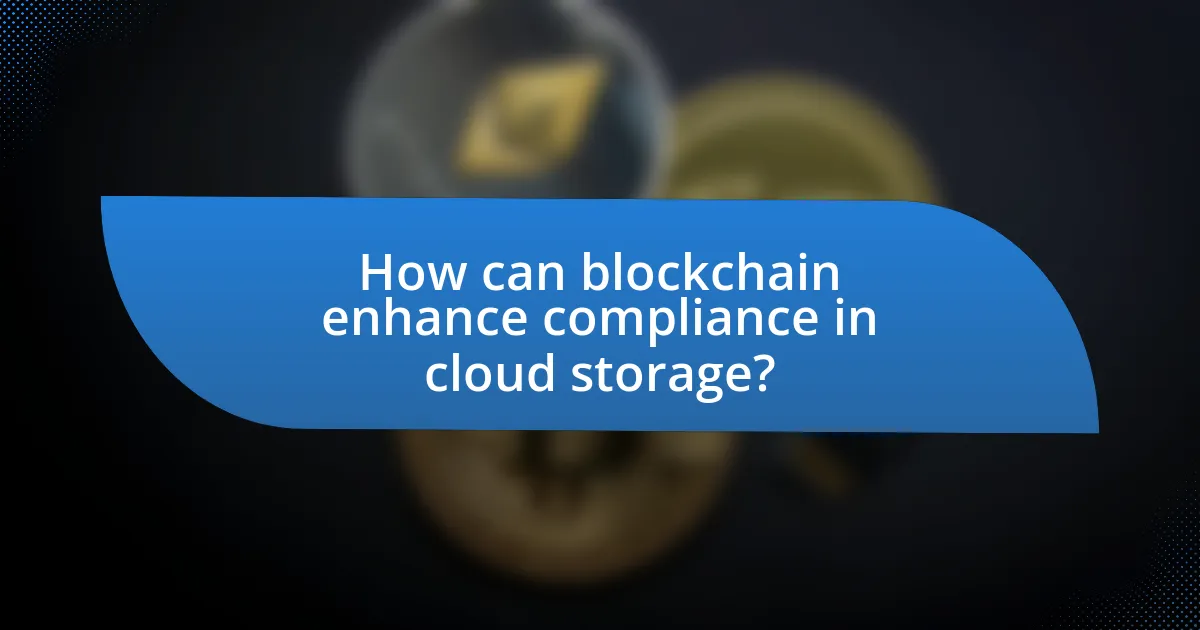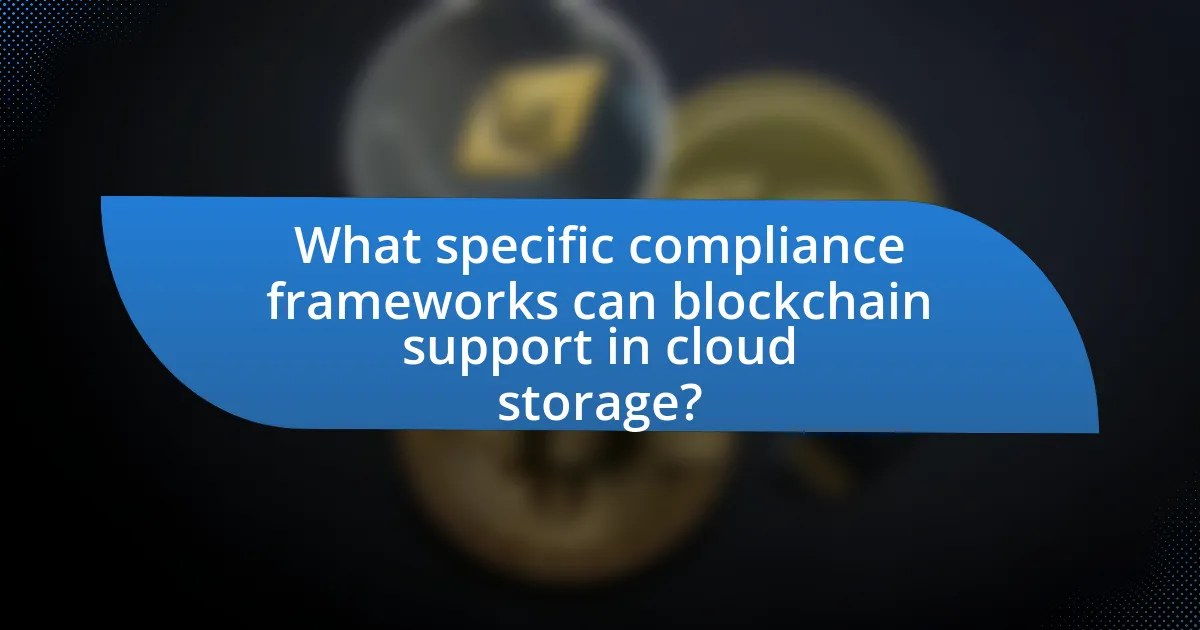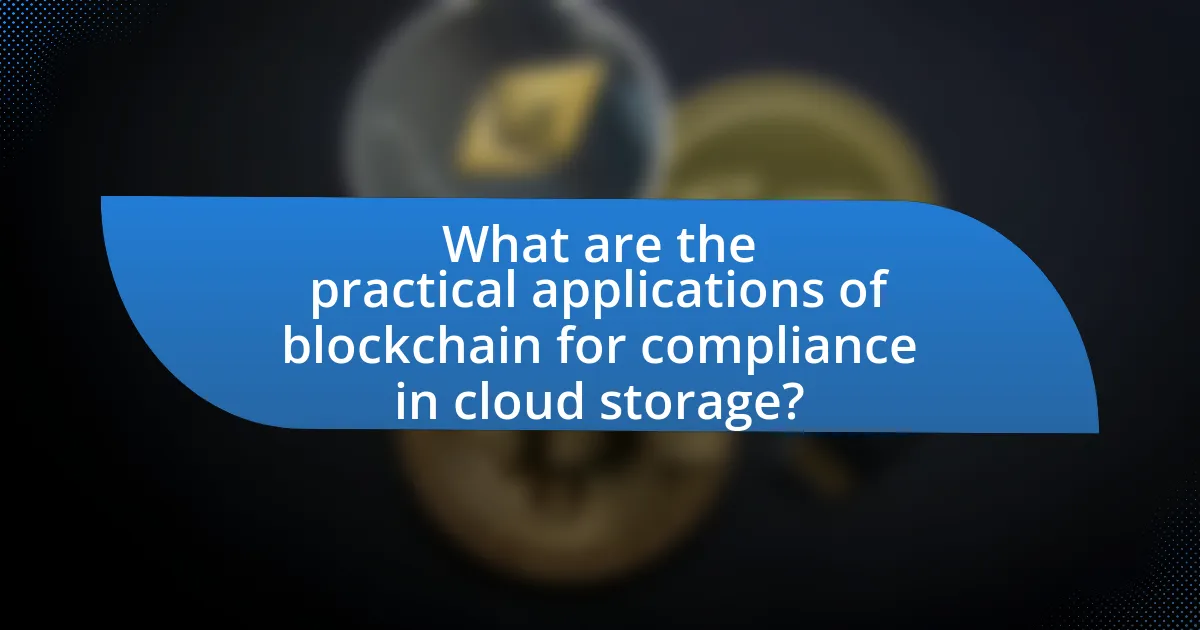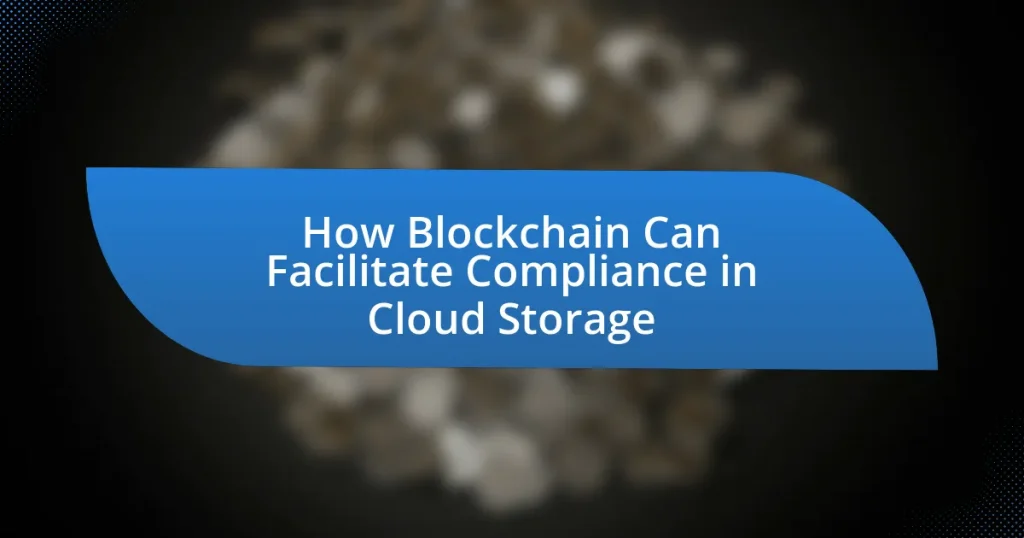The article focuses on how blockchain technology can enhance compliance in cloud storage environments. It outlines the challenges organizations face regarding data privacy regulations, data sovereignty, and security standards, emphasizing the importance of robust compliance strategies. Key features of blockchain, such as immutability, transparency, and decentralization, are discussed as mechanisms that support compliance with frameworks like GDPR and HIPAA. Additionally, the article explores practical applications of blockchain for compliance, including the automation of compliance checks through smart contracts and the provision of secure audit trails, ultimately highlighting the role of blockchain in ensuring data integrity and security in cloud storage.

How can blockchain enhance compliance in cloud storage?
Blockchain can enhance compliance in cloud storage by providing immutable records of data access and transactions. This technology ensures that all actions taken on stored data are transparently logged, creating a verifiable audit trail that can be easily reviewed for compliance with regulations such as GDPR or HIPAA. The decentralized nature of blockchain reduces the risk of data tampering, as altering any record would require consensus across the network, thereby maintaining data integrity. Additionally, smart contracts can automate compliance checks, ensuring that data handling adheres to predefined rules and regulations without manual intervention. This combination of transparency, security, and automation significantly strengthens compliance efforts in cloud storage environments.
What are the key compliance challenges in cloud storage?
The key compliance challenges in cloud storage include data privacy regulations, data sovereignty issues, and security standards adherence. Data privacy regulations, such as the General Data Protection Regulation (GDPR), require organizations to ensure that personal data is processed lawfully, which can be complex in a cloud environment where data may be stored across multiple jurisdictions. Data sovereignty issues arise when data is stored in a location that is subject to different legal frameworks, potentially conflicting with the laws of the organization’s home country. Additionally, adherence to security standards, such as ISO/IEC 27001, is crucial for maintaining compliance, as organizations must implement appropriate security measures to protect sensitive information stored in the cloud. These challenges necessitate robust compliance strategies to mitigate risks associated with cloud storage.
How do data privacy regulations impact cloud storage compliance?
Data privacy regulations significantly impact cloud storage compliance by imposing strict requirements on how data is collected, stored, and processed. Regulations such as the General Data Protection Regulation (GDPR) mandate that organizations ensure data protection measures are in place, including data encryption, access controls, and the ability to delete personal data upon request. Compliance with these regulations often requires cloud storage providers to implement robust security protocols and maintain transparency regarding data handling practices. For instance, non-compliance can result in substantial fines, as evidenced by GDPR penalties reaching up to 4% of annual global turnover or €20 million, whichever is higher. Thus, adherence to data privacy regulations is crucial for organizations utilizing cloud storage to avoid legal repercussions and maintain customer trust.
What role does data security play in compliance for cloud storage?
Data security is essential for compliance in cloud storage as it ensures the protection of sensitive information against unauthorized access and breaches. Compliance regulations, such as GDPR and HIPAA, mandate strict data protection measures, requiring organizations to implement robust security protocols. For instance, according to a report by the Ponemon Institute, 60% of organizations cited data security as a primary factor in achieving compliance with these regulations. Therefore, effective data security not only safeguards data integrity but also helps organizations meet legal obligations, thereby avoiding potential fines and reputational damage.
Why is blockchain technology relevant for compliance?
Blockchain technology is relevant for compliance because it provides a secure, transparent, and immutable record of transactions. This characteristic ensures that all data entries are verifiable and traceable, which is essential for meeting regulatory requirements. For instance, in industries like finance and healthcare, where compliance with regulations such as GDPR or HIPAA is critical, blockchain’s ability to maintain an accurate audit trail helps organizations demonstrate adherence to these standards. Additionally, the decentralized nature of blockchain reduces the risk of data tampering, further enhancing compliance efforts by ensuring that records remain intact and trustworthy.
What unique features of blockchain support compliance efforts?
Blockchain’s unique features that support compliance efforts include immutability, transparency, and decentralization. Immutability ensures that once data is recorded on the blockchain, it cannot be altered or deleted, providing a reliable audit trail for compliance verification. Transparency allows all participants in the network to access the same information, facilitating real-time monitoring and accountability. Decentralization reduces the risk of single points of failure and enhances security, making it harder for unauthorized changes to occur. These features collectively enhance trust and integrity in compliance processes, as evidenced by the increasing adoption of blockchain in regulated industries such as finance and healthcare, where strict compliance is essential.
How does blockchain ensure data integrity and transparency?
Blockchain ensures data integrity and transparency through its decentralized and immutable ledger system. Each transaction is recorded in a block and linked to the previous block, creating a chain that is resistant to tampering. This structure means that once data is added to the blockchain, it cannot be altered without consensus from the network participants, thereby preserving the accuracy and reliability of the information. Additionally, the use of cryptographic hashing ensures that any changes to the data can be easily detected, further enhancing transparency. According to a study by the World Economic Forum, blockchain technology can reduce fraud and increase trust in data sharing, demonstrating its effectiveness in maintaining data integrity and transparency.

What specific compliance frameworks can blockchain support in cloud storage?
Blockchain can support several specific compliance frameworks in cloud storage, including GDPR, HIPAA, and PCI DSS. These frameworks require stringent data protection and privacy measures, which blockchain’s decentralized and immutable nature can enhance. For instance, GDPR mandates data subject rights and transparency, which blockchain can facilitate through its transparent ledger, allowing users to track data access and modifications. Similarly, HIPAA’s requirements for safeguarding health information can be met by using blockchain to ensure secure and auditable access to sensitive data. Lastly, PCI DSS compliance for payment data security can be strengthened by blockchain’s encryption and transaction integrity features, reducing the risk of data breaches.
How does blockchain facilitate GDPR compliance in cloud storage?
Blockchain facilitates GDPR compliance in cloud storage by providing a decentralized and immutable ledger that enhances data integrity and transparency. This technology allows organizations to securely store personal data while ensuring that individuals maintain control over their information, as required by GDPR. For instance, blockchain enables the implementation of data access and deletion protocols, allowing users to exercise their rights under GDPR, such as the right to erasure. Additionally, the transparency of blockchain ensures that any data processing activities are recorded and can be audited, which aligns with GDPR’s accountability principle. This combination of features supports organizations in demonstrating compliance with GDPR requirements effectively.
What mechanisms does blockchain provide for data subject rights under GDPR?
Blockchain provides mechanisms for data subject rights under GDPR through its inherent characteristics of immutability, transparency, and decentralization. These features enable individuals to exercise their rights, such as the right to access, rectify, and erase personal data. For instance, the immutability of blockchain ensures that once data is recorded, it cannot be altered or deleted without consensus, which supports the right to data integrity. Transparency allows data subjects to verify how their data is being used and shared, facilitating the right to access. Additionally, smart contracts can automate compliance processes, ensuring that data subjects can easily request and receive their data or request its deletion, thus supporting the right to erasure. These mechanisms collectively enhance compliance with GDPR by providing a secure and verifiable way for individuals to manage their personal data.
How can blockchain assist in data breach notifications as per GDPR?
Blockchain can assist in data breach notifications as per GDPR by providing a secure, immutable ledger for recording and tracking data breaches. This technology enables organizations to log incidents in real-time, ensuring that all relevant details, such as the nature of the breach and the affected data, are accurately documented and timestamped. The transparency and traceability of blockchain can facilitate timely notifications to affected individuals and regulatory authorities, as required by GDPR, thereby enhancing compliance. Additionally, the decentralized nature of blockchain reduces the risk of tampering with breach records, ensuring that the information remains trustworthy and verifiable.
What is the role of blockchain in HIPAA compliance for cloud storage?
Blockchain plays a crucial role in HIPAA compliance for cloud storage by ensuring the integrity, security, and traceability of protected health information (PHI). It achieves this through decentralized data management, which prevents unauthorized access and tampering, thereby aligning with HIPAA’s requirements for safeguarding sensitive patient data. The immutable nature of blockchain records allows for transparent audit trails, enabling healthcare organizations to demonstrate compliance during audits. Additionally, smart contracts can automate compliance processes, ensuring that data sharing adheres to HIPAA regulations. This combination of features supports the secure handling of PHI in cloud environments, ultimately enhancing patient privacy and trust.
How does blockchain enhance patient data security in healthcare cloud storage?
Blockchain enhances patient data security in healthcare cloud storage by providing a decentralized and immutable ledger that records all transactions related to patient data. This technology ensures that any changes to patient records are securely logged and cannot be altered retroactively, which significantly reduces the risk of data breaches and unauthorized access. For instance, a study published in the Journal of Medical Internet Research highlights that blockchain can improve data integrity and confidentiality by using cryptographic techniques to secure patient information, making it accessible only to authorized parties. This combination of decentralization, immutability, and encryption establishes a robust framework for safeguarding sensitive healthcare data in cloud environments.
What auditing capabilities does blockchain offer for HIPAA compliance?
Blockchain offers robust auditing capabilities for HIPAA compliance by providing an immutable and transparent ledger of all transactions involving protected health information (PHI). This technology ensures that every access, modification, and sharing of PHI is recorded in a way that cannot be altered or deleted, thereby creating a reliable audit trail. The decentralized nature of blockchain enhances security and reduces the risk of unauthorized access, as each participant in the network has a copy of the entire ledger, making it difficult for any single entity to manipulate the data. Furthermore, smart contracts can automate compliance checks and enforce policies, ensuring that only authorized users can access sensitive information. This capability aligns with HIPAA’s requirements for maintaining the confidentiality, integrity, and availability of PHI, thereby facilitating compliance in cloud storage environments.

What are the practical applications of blockchain for compliance in cloud storage?
Blockchain technology has practical applications for compliance in cloud storage by providing immutable data records, enhancing data integrity, and facilitating audit trails. These features ensure that data stored in the cloud adheres to regulatory requirements, such as GDPR and HIPAA. For instance, blockchain’s decentralized ledger allows organizations to maintain a transparent and tamper-proof record of data access and modifications, which is crucial for compliance audits. Additionally, smart contracts can automate compliance checks, ensuring that data handling processes meet legal standards without manual intervention. This combination of transparency, security, and automation significantly reduces the risk of non-compliance and enhances trust in cloud storage solutions.
How can organizations implement blockchain solutions for compliance?
Organizations can implement blockchain solutions for compliance by integrating smart contracts and decentralized ledgers to ensure transparency and traceability of data transactions. Smart contracts automate compliance checks by executing predefined rules, which reduces human error and enhances accountability. For instance, a study by Deloitte highlights that 40% of organizations using blockchain for compliance reported improved data integrity and reduced audit costs. Additionally, utilizing a decentralized ledger allows for real-time monitoring of compliance-related activities, ensuring that all stakeholders have access to the same immutable records, thereby facilitating regulatory adherence.
What steps should organizations take to integrate blockchain with existing cloud storage systems?
Organizations should take the following steps to integrate blockchain with existing cloud storage systems: first, assess the current cloud infrastructure to identify compatibility with blockchain technology. This involves evaluating the existing data management processes and security protocols to ensure they can support blockchain integration. Next, select a suitable blockchain platform that aligns with the organization’s needs, such as Ethereum or Hyperledger, which provide robust frameworks for data integrity and security.
Following platform selection, organizations should develop a clear integration strategy that outlines how blockchain will enhance data storage, retrieval, and compliance processes. This strategy should include defining the specific use cases for blockchain, such as improving data traceability or enhancing security measures.
Subsequently, organizations must implement the necessary APIs and middleware to facilitate communication between the cloud storage system and the blockchain network. This step is crucial for ensuring seamless data flow and interoperability between the two systems.
Finally, organizations should conduct thorough testing and validation of the integrated system to ensure that it meets compliance requirements and performs as expected. Continuous monitoring and updates will be necessary to adapt to evolving regulatory standards and technological advancements.
What are the potential challenges in adopting blockchain for compliance?
The potential challenges in adopting blockchain for compliance include regulatory uncertainty, integration complexity, and scalability issues. Regulatory uncertainty arises because existing laws may not adequately address blockchain technology, leading to compliance risks for organizations. Integration complexity is a challenge as organizations must align blockchain systems with existing compliance frameworks and IT infrastructure, which can be resource-intensive. Scalability issues occur because many blockchain networks struggle to handle large volumes of transactions efficiently, potentially hindering compliance processes that require real-time data access and processing. These challenges can impede the effective implementation of blockchain solutions in compliance contexts.
What best practices should organizations follow when using blockchain for compliance?
Organizations should implement several best practices when using blockchain for compliance, including ensuring data integrity, maintaining transparency, and adhering to regulatory standards. Data integrity is achieved through cryptographic hashing, which secures transaction records and prevents unauthorized alterations. Transparency is facilitated by the immutable nature of blockchain, allowing stakeholders to access and verify compliance-related information in real-time. Additionally, organizations must stay updated with evolving regulations, such as GDPR or HIPAA, to ensure that their blockchain solutions align with legal requirements. These practices collectively enhance trust and accountability in compliance processes, as evidenced by the increasing adoption of blockchain in regulated industries like finance and healthcare, where compliance is critical.
How can organizations ensure ongoing compliance with evolving regulations using blockchain?
Organizations can ensure ongoing compliance with evolving regulations using blockchain by implementing smart contracts that automatically enforce compliance rules and audit trails that provide transparent records of transactions. Smart contracts can be programmed to adhere to specific regulatory requirements, automatically executing actions when conditions are met, thus reducing the risk of human error and ensuring adherence to regulations. Additionally, the immutable nature of blockchain allows for secure and verifiable audit trails, enabling organizations to demonstrate compliance during regulatory reviews. This capability is supported by the fact that blockchain technology has been adopted in various industries, such as finance and healthcare, to enhance compliance efforts by providing real-time data access and reducing the complexity of regulatory reporting.
What tools and resources are available to support blockchain compliance initiatives?
Blockchain compliance initiatives can be supported by tools such as compliance management software, blockchain analytics platforms, and regulatory reporting tools. Compliance management software, like ComplyAdvantage, helps organizations monitor and manage compliance risks associated with blockchain transactions. Blockchain analytics platforms, such as Chainalysis and Elliptic, provide insights into transaction flows and help identify suspicious activities, ensuring adherence to regulations. Regulatory reporting tools, including Blockpass, facilitate the reporting of blockchain-related activities to regulatory bodies, streamlining compliance processes. These tools collectively enhance transparency, traceability, and accountability in blockchain operations, which are critical for meeting compliance requirements in cloud storage environments.


